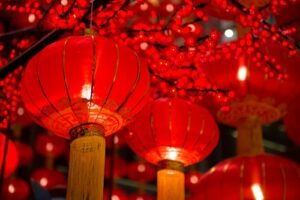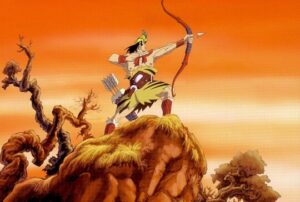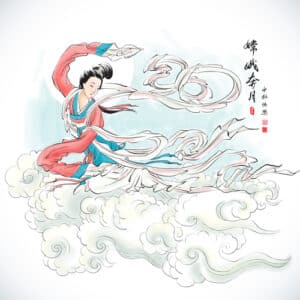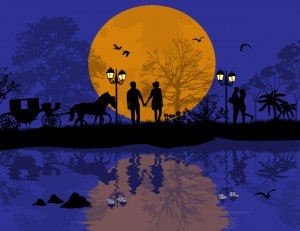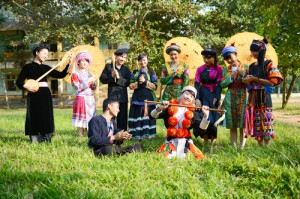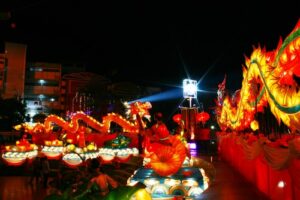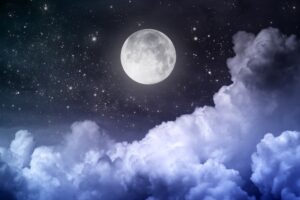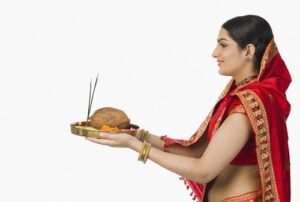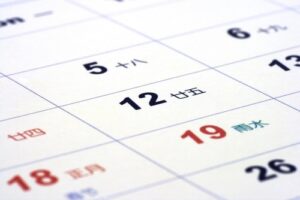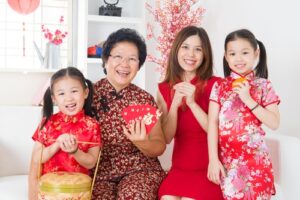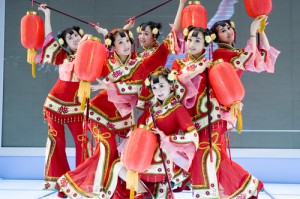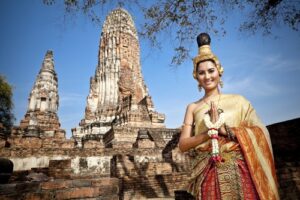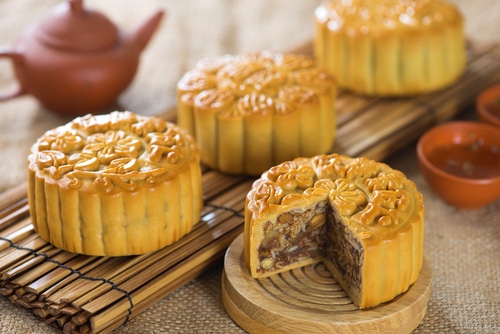
The Chinese Learner’s Guide to the Mid-Autumn Festival
Among the biggest holidays in China is the Mid-Autumn Festival. It is said to have originated when early Chinese scholars recognized the moon’s relationship with climate, seasonal changes and agricultural successes from the previous year.
Due to the moon cycle’s connection with agriculture, the holiday is closely tied to autumn harvests, honoring hard work, sufficient rainfall and overall crop yields. Learn all the vocab and traditions to celebrate the Mid-Autumn Festival.
Contents
- Chinese Mid-Autumn Festival Vocabulary
-
- 中秋节 (zhōng qiū jié) — Mid-Autumn Festival
- 团圆 (tuán yuán) — Reunion
- 月饼 (yuè bǐng) — Mooncake
- 灯笼 (dēng lóng) — Lantern
- 后羿 (hòu yì) — Houyi, a Mythological Chinese Figure
- 嫦娥 (cháng é) — Chang’e, a Chinese Goddess
- 赏月 (shǎng yuè) — To Gaze at the Moon; To Admire the Moon
- 习俗 (xí sú) — Custom; Habit
- 节日 (jié rì) — Festival; Holiday
- 月亮 (yuè liàng) — Moon
- 祭祀 (jì sì) — To Offer Sacrifices; To Worship
- 农历 (nóng lì) — The Lunar/Traditional Calendar
- 佳节 (jiā jié) — Festival; Holiday
- 送礼 (sòng lǐ) — To Give Someone a Gift
- 思念 (sī niàn) — To Long for; To Miss; To Think of
- 亲情 (qīn qíng) — Familial Love; Kinship
- 传统 (chuán tǒng) — Tradition
- 文化 (wén huà) — Culture
- Key Mid-Autumn Festival Traditions
- Places to Go for the Chinese Mid-Autumn Festival
- And One More Thing...
Download: This blog post is available as a convenient and portable PDF that you can take anywhere. Click here to get a copy. (Download)
Chinese Mid-Autumn Festival Vocabulary
中秋节 (zhōng qiū jié) — Mid-Autumn Festival
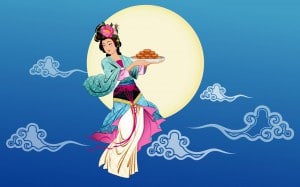
中秋节是中国的传统节日。
(zhōng qiū jié shì zhōng guó de chuán tǒng jié rì.)
Mid-Autumn Festival is a traditional Chinese festival.
团圆 (tuán yuán) — Reunion
今天是我们家人团圆的日子。
(jīn tiān shì wǒ men jiā rén tuán yuán de rì zi.)
Today is the day of our family reunion.
月饼 (yuè bǐng) — Mooncake
我喜欢吃冰淇淋月饼。
(wǒ xǐ huān chī bīng qí lín yuè bǐng.)
I like to eat ice-cream mooncakes.
灯笼 (dēng lóng) — Lantern
街上的灯笼真好看!
(jiē shàng de dēng lóng zhēn hǎo kàn!)
The lanterns on the street are really pretty!
后羿
( hòu yì) — Houyi, a Mythological Chinese Figure
hòu yì) — Houyi, a Mythological Chinese Figure
后羿是古代传说中的一位英雄。
(hòu yì shì gǔ dài chuán shuō zhōng de yī wèi yīng xióng.)
Houyi is a hero of ancient legends.
嫦娥 (cháng é) — Chang’e, a Chinese Goddess
据说,嫦娥生活在月宫里。
(jù shuō, cháng é shēng huó zài yuè gōng lǐ.)
It’s said that Chang’e lives in the Moon Palace.
赏月 (shǎng yuè) — To Gaze at the Moon; To Admire the Moon
很多人都到山上的亭子里去赏月。
(hěn duō rén dōu dào shān shàng de tíng zi lǐ qù shǎng yuè.)
Many people go to mountaintop pavilions to admire the moon.
习俗 (xí sú) — Custom; Habit
每一个节日,都有很多不同的习俗。
(měi yí gè jié rì, dōu yǒu hěn duō bù tóng de xí sú.)
Every festival has many different customs.
节日 (jié rì) — Festival; Holiday
春节对中国人来说,是一年里最重要的节日。
(chūn jié duì zhōng guó rén lái shuō, shì yì nián lǐ zuì zhòng yào de jié rì.)
To the Chinese, the Spring Festival is the most important festival of the year.
月亮 (yuè liàng) — Moon
晚上的月亮又大又圆,真漂亮!
(wǎn shàng de yuè liàng yòu dà yòu yuán, zhēn piào liang!)
The moon at night is large and round – it’s so pretty!
祭祀 (jì sì) — To Offer Sacrifices; To Worship
明天,他们要举行祭祀祖先的仪式。
(míng tiān, tā men yào jǔ xíng jì sì zǔ xiān de yí shì.)
Tomorrow, they will be holding a ceremony to offer sacrifices to the ancestors.
农历 (nóng lì) — The Lunar/Traditional Calendar
他的生日是每年的农历八月初八。
(tā de shēng rì shì měi nián de nóng lì bā yuè chū bā.)
His birthday falls on the eighth day of the eighth month of every lunar year.
佳节 (jiā jié) — Festival; Holiday
每逢佳节倍思亲。
(měi féng jiā jié bèi sī qīn.)
Every festival, the yearning for one’s family doubles.
送礼 (sòng lǐ) — To Give Someone a Gift
后天是情人节,你要给我送礼的。
(hòu tiān shì qíng rén jié, nǐ yào gěi wǒ sòng lǐ de. )
It’s Valentine’s Day the day after tomorrow – you have to give me a gift.
思念 (sī niàn) — To Long for; To Miss; To Think of
我很思念远方的亲人。
(wǒ hěn sī niàn yuǎn fāng de qīn rén.)
I really miss my family who are far away.
亲情 (qīn qíng) — Familial Love; Kinship
我最看重的是家人间的亲情。
(wǒ zuì kàn zhòng de shì jiā rén jiān de qīn qíng.)
What I value the most is the kinship between family members.
传统 (chuán tǒng) — Tradition
孝敬父母,是中国人的优良传统。
(xiào jìng fù mǔ, shì zhōng guó rén de yōu liáng chuán tǒng.)
Being filial to parents is an excellent tradition of the Chinese.
文化 (wén huà) — Culture
他是研究中国文化的专家。
(tā shì yán jiū zhōng guó wén huà de zhuān jiā.)
He’s an expert who studies Chinese culture.
Key Mid-Autumn Festival Traditions
Family Reunions
The most important part of the Chinese Mid-Autumn festival is the family reunion. They get together to enjoy the bright moon, holiday activities, special foods, songs and stories. It is believed that the moon is symbolic of family togetherness.
Mooncakes
Mooncakes are the official Mid-Autumn Festival holiday treat. They are round to reflect the shape of the moon, and their decorations and fillings range from simple to elaborate. The typical mooncake is made from wheat flour and stuffed with sugary fillings such as sweetened red bean paste, powdered lotus seeds,
Lanterns
Lanterns are illuminated for many different Chinese holidays, and the Mid-Autumn Festival is no exception. While lanterns do hold symbolic meanings, the primary reason behind lighting them up is because they’re beautiful, mimicking the moon’s brightness in the city streets.
Stories
Plenty of legends swirl around the holiday. In one historical tale, an ancient Chinese dynasty sends secret messages tucked away in mooncakes. Other fanciful stories abound, recounting the fateful actions of divine beings, charismatic animals, and journeys to the moon. These are told during family gatherings and public events.
Prayers and Sacrifices to the Moon Goddess
While there are many variations on this classic Mid-Autumn Festival story, here’s the main gist: the legendary hero Houyi performs a feat of heroic strength and a divine being gives him an elixir of immortality. In every version of this story, Houyi’s wife, Chang’e, ends up consuming the elixir herself and is shot off to the moon, where she dwells in a lunar palace to this day. Sacrifices and prayers made to the moon during the Mid-Autumn Festival go straight to her doorstep.
The Chinese fascination with Chang’e has led the nation’s space program to name lunar rovers and other space travel devices after her. Meanwhile, in the USA, Houston officially requested that Buzz Aldrin watch out for her.
Places to Go for the Chinese Mid-Autumn Festival
You can get in on the most action by visiting a lively urban area, or you can choose to soak up the cherished moonlight in a peaceful, rural town.
In China’s more populous cities, colored lanterns hang from every storefront and there are tons of public events to enjoy. Shanghai’s skyscrapers boast some of the most impressive Mid-Autumn Festival views. In Beijing, you can visit the Altar of the Moon, where long-ago Chinese emperors once made sacrifices to the moon. This site, along with the many temples and altars scattered throughout the city, offers a tranquil moon-viewing location. Parks, gardens, riverfront streets and bridges are some of the best places to explore during this festival.
If you prefer a rural location, join a quiet Chinese village on their ascent to a mountaintop where they observe the moon in even greater peace. You can also choose to hop on board a cruise ship or riverboat – the moon is said to be even more beautiful when reflected in the water, and you’ll get a nice vista of the lanterns burning on shore.
Travel to China, or visit a Chinese community in your area to see the fun, beautiful celebrations for yourself! Family gatherings, lanterns, mooncakes, moon-viewing parties, songs, poems, stories, and games are among the customs observed during the Mid-Autumn Festival.
Of course, you have to remember that China is an extraordinarily diverse country. The many different ethnic groups residing there have their own, unique ways of celebrating the holiday. Explore and discover the many reasons why the Mid-Autumn Festival is so important to Chinese culture.
Download: This blog post is available as a convenient and portable PDF that you can take anywhere. Click here to get a copy. (Download)
And One More Thing...
If you want to continue learning Chinese with interactive and authentic Chinese content, then you'll love FluentU.
FluentU naturally eases you into learning Chinese language. Native Chinese content comes within reach, and you'll learn Chinese as it's spoken in real life.
FluentU has a wide range of contemporary videos—like dramas, TV shows, commercials and music videos.
FluentU brings these native Chinese videos within reach via interactive captions. You can tap on any word to instantly look it up. All words have carefully written definitions and examples that will help you understand how a word is used. Tap to add words you'd like to review to a vocab list.
FluentU's Learn Mode turns every video into a language learning lesson. You can always swipe left or right to see more examples for the word you're learning.
The best part is that FluentU always keeps track of your vocabulary. It customizes quizzes to focus on areas that need attention and reminds you when it’s time to review what you’ve learned. You have a 100% personalized experience.
Start using the FluentU website on your computer or tablet or, better yet, download the FluentU app from the iTunes or Google Play store. Click here to take advantage of our current sale! (Expires at the end of this month.)


